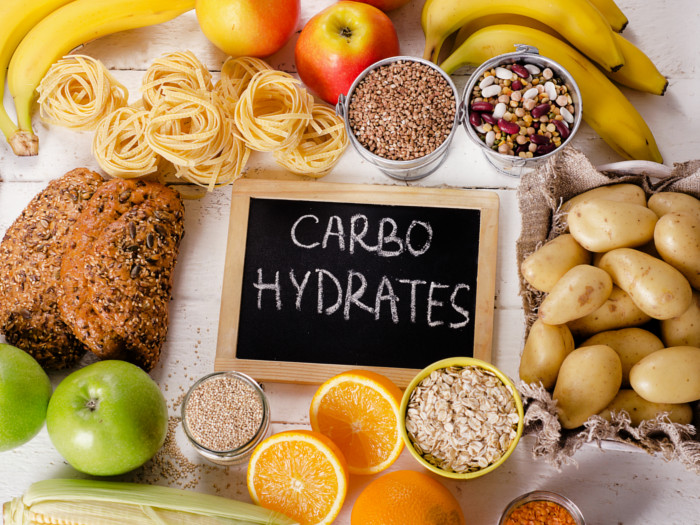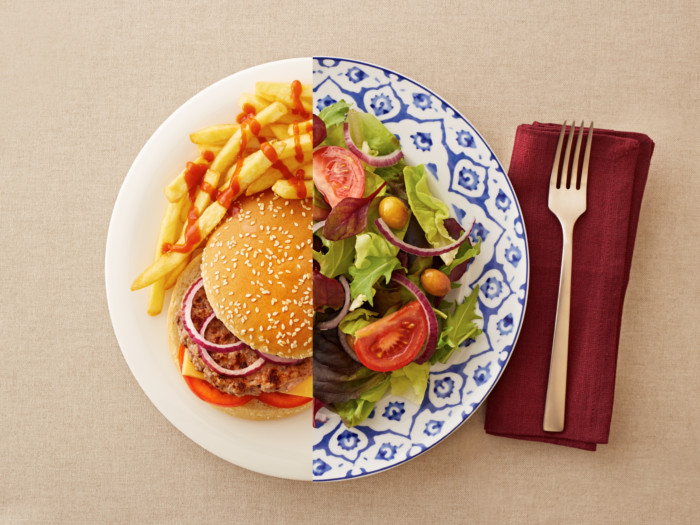Ah yes, probably one of the most controversial topics when it comes to weight loss. Carbohydrates – aka sugar. You’ve probably heard it before – cutting carbohydrates is key to weight loss. But is it really?
The answer might surprise you, and I’m going to break it down so it’s as easy as possible to understand.
The Truth About Carbohydrates
First of all, what the heck even is a carbohydrate? Carbohydrates are a type of macronutrient (fats and protein are also macronutrients) that are essential for the body. Essential means that the body can’t make it on its own, therefore it needs to be supplied in the diet.
What do we need carbohydrates for? Primarily for energy to fuel our bodies during anything and everything, such as taking a shower in the morning to eating lunch or running on the treadmill. Our body relies on a storage form of carbohydrate, called glycogen (which is stored in the liver and muscle) to give our body the energy it needs.
According to McArdle et al. “Sports and Exercise Nutrition” (2009), an average person has about 1,600 calories of glycogen stored in the liver and muscle, which usually only lasts for about 2-4 hours if a person is rigorously exercising. [1]
Carbohydrates are also needed to supply the brain and red blood cells with energy. You’ll see a lot of different forms and names for carbohydrates, such as glucose, galactose, fructose, sucrose, etc. We won’t get into the science, for now, I’ll save that for a different day, but just note these are all different types of carbohydrates -aka sugar.

Now you might be thinking, what are food sources of carbohydrates?
There are TONS, and I bet you know a few! Bread, pasta, cereals, rice, oatmeal, and grains are some of the common ones. But so are beans, lentils, fruit, milk, yogurt and starchy vegetables such as corn, peas, potatoes. Wait, aren’t peas a vegetable though?! I know, my patients always look at me crazy when I say peas, corn, and potatoes are starchy vegetables and technically considered carbohydrates. 1 cup of peas is approximately 21 grams of carbohydrates. (A slice of bread is about 15 grams of carbohydrates, this is why peas are considered a starchy vegetable.)
Don’t get me wrong, starchy vegetables are good for you! They are packed with fiber and various vitamins and minerals such as iron, niacin and vitamin A!
Carbohydrates & Weight Loss
My purpose of bringing up starchy vegetables is to have you be aware of the different types of carbohydrates out there.
Deep breath.
Are you still with me?
Back to our main question – are cutting carbohydrates necessary for weight loss?
No, they are not.
Yes, you read that right.
Quick victory dance here!
The first thing you’re probably wondering is why then do some of the popular weight loss diets such as Atkins, Paleo and the Ketogenic diet emphasize “low carbohydrate”?
Well, there is no doubt if you cut carbs out of your diet you will lose weight, but I don’t believe this is the most effective way to do so and it’s definitely NOT necessary for weight loss.
Thorn and Lean (2017) published a review looking for an optimal diet for weight management and metabolic health.
They looked at the research behind low-carb and low-fat diet groups and found that although low-carbohydrate diet groups typically report better weight loss outcomes at 6 months than the low-carb diet groups, this difference disappears at 12 months, with no significant change in weight loss. [2]
This could largely be because when you cut carbs in your diet, you tend to get a pretty good amount of weight loss in the first week but this is mostly due to losing water weight.
Glycogen is surrounded by a lot of water, and when you deplete your glycogen, you deplete the water that accompanies it, leading to even more weight loss.
People usually think this low-carbohydrate diet thing is amazing and works! But the weight loss will eventually slow down after about the first week, or even longer in individuals that are heavier. So how do we lose weight? Weight loss is dependent on calories in being less than calories out, which means creating a calorie deficit for our body.
It doesn’t matter if you are cutting carbs, protein or fat, you will lose weight, not because you are cutting a specific macronutrient, but because you are cutting CALORIES!
Let me say it again, cutting calories is what causes you to lose pounds, not specifically cutting carbohydrates.
Let me talk to you about why I’m NOT a fan of low-carbohydrate diets.
First of all, it’s not realistic. We are surrounded by carbohydrates in our food supply. This is just the nature of the environment we live in. It’s impossible to vow to never touch a cupcake or eat a chicken taco again.
Plus, our body needs carbohydrates for energy and our brain and red blood cells rely on them!
The typical person needs about 300 grams of carbohydrates (45-65% of total calories should be from carbohydrates based on the recommended daily value). When we do not eat enough carbohydrates- less than 130 grams, our body starts to break down muscle for energy! I know I’m not busting my butt in the gym and lifting weights to break down my precious muscle.
Okay, one thing I do want to make clear is that I personally DO feel like we consume too many carbohydrates in our diets. This is often times why I feel like carbs are the culprit. They are easily processed, often times calorically dense and plentiful- which gives people easy access to them.
I was just thinking about this as I was eating my breakfast this morning- yogurt with cereal, tangerines, and tea with milk and a little spoon of sugar.
This is a healthy breakfast- I got my protein, fruit, and whole-grains, but each one of these items has carbohydrates, regardless of it being a healthy breakfast!
It’s really hard to NOT get enough carbs in our diet.
I wish this was the same with vegetables…One day.

Learn how to make healthy food choices Photo Credit: Shutterstock
Also, not all carbohydrates are made equal. I’m all for focusing on carbohydrates coming from whole foods such as whole grains, milk, yogurt, fruits and vegetables and giving cookies, crackers, and chips less attention.
Okay, so what’s the best way to create a calorie deficit? Again, we have three macronutrients: carbohydrates, fats, and protein. You definitely don’t want to cut protein, especially because when you are in a calorie deficit you will lose a little bit of muscle (not as much as when you are on a low-carbohydrate diet), so making sure your intake of protein is adequate, is a very good idea. Fat usually has more calories per gram (9 calories per gram compared to 4 calories per gram in carbohydrates and protein). But there are fats that are essential for our health such as monounsaturated and polyunsaturated fats, so we also want to make sure we get adequate amounts of healthy fats in our diet.
So the best macronutrient to cut is a combination of carbohydrates and fats. Focus on consuming healthy carbohydrates and healthy fats along with protein to create that calorie deficit you need to promote long-term weight loss.
